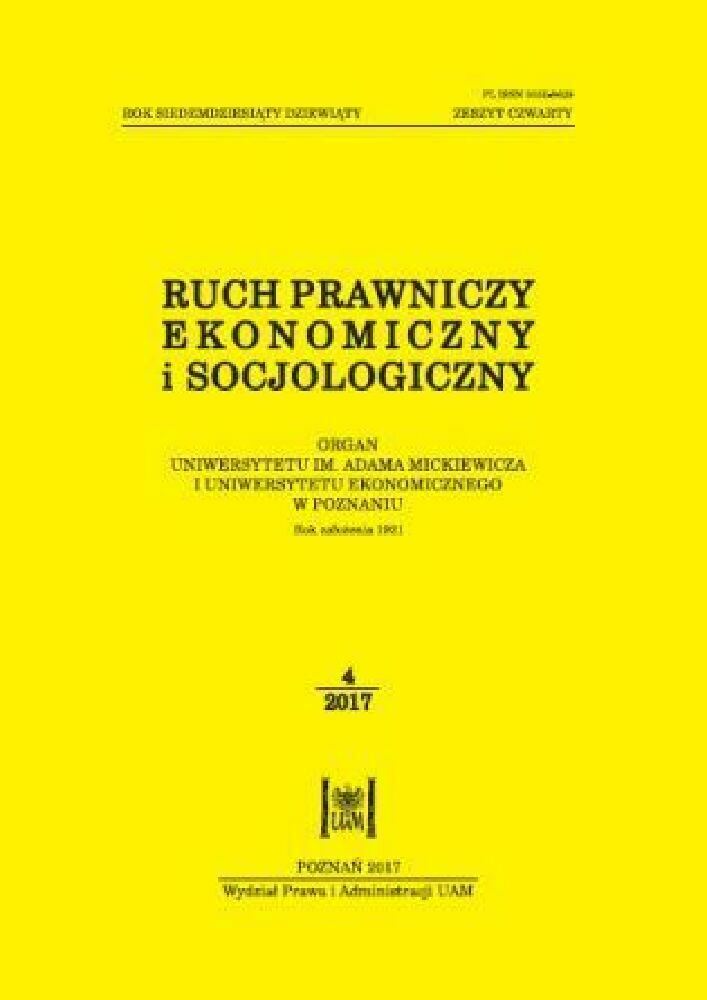Abstract
The aim of the paper is to disclose the limitations of Corporate Social Responsibility (CSR) standards. First, the aims and forms of CSR standardisation and the spectrum of CSR standards including their possible classifications are presented. The next part of the paper deals with the empirical data verifying the efficiency of CSR standards which often prove to be dysfunctional or even enhancing irresponsibility. The last part is devoted to the analysis of the causes of the unreliability of CSR standards.References
Barrientos, S., Smith, S. (2007), The ETI Code of Practice: Do Workers Really Benefit?, Brighton: IDS.
Behnam, M., MacLean, T.L. (2011), Where is the accountability in international accountability standards?: A decoupling perspective, Business Ethics Quarterly 21(1): 45-72.
Bielak, D., Bonini, S.M.J., Oppenheim, J.M. (2007), CEOs on strategy and social issues, McKinsey Quarterly 43: 8-12.
Beschomer, T., Müller, M. (2007), Social standards: toward an active ethical involvement of businesses in developing countries, Journal of Business Ethics 73: 11-20.
Blair, M.M., Williams, C.A. Lin, L.-W. (2008), The Roles of Standardization, Certification, and Assurance Services in Global Commerce, Paper presented at the conference CSR: Law, Operations, and Strategy, Georgetown University, Washington, D.C., Nov 7, 2008.
de Colle, S. (2006), CSR and management systems, w: Alluche, J. (ed.), Corporate Social Responsibility: Concepts, Accountability and Reporting, New York: Palgrave MacMillan.
de Colle, S., Henriques, A., Sarasvathy, S. (2014), The paradox of corporate social responsibility standards, Journal of Business Ethics 125: 177-191.
Elkington, J. (2002), Trust Us: The 2002 Global Reporters Survey of Corporate Sustainability Reporting. London: SustainAbility.
Gereffi, G., Garcia-Johnson, R., Sasser, E. (2001), The NGO-industrial complex, Foreign Policy 125: 56-65.
Gilbert, D.U., Rasche, A. (2007), Discourse ethics and social accountability – the ethics of SA 8000, Business Ethics Quarterly 17(2): 187-216.
Gilbert, D.U., Rasche, A. (2008), From stakeholder management to stakeholder engagement, Journal of Business Ethics 82: 755-773.
Gilbert, D.U., Rasche, A., Waddock, S. (2011), Accountability in a global economy: the emergence of international accountability standards, Business Ethics Quarterly 21(1): 23-44.
Henriques, A. (2010), Corporate Impact: Measuring and Managing Your Social Footprint, London: Earthscan.
Hiscox, M.J. et al. (2009), Evaluating the impact of SA 8000 Certification, [w:] Leipziger, D. (ed.), Social Accountability 8000: The First Decade Implementation, Influence, and Impact, Sheffield, UK: Greenleaf: 147-165.
King, A., Lenox, M. (2000), Industry self-regulation without sanctions: the chemical industry’s responsible care program, Academy of Management Journal, 43: 698-716.
King, A., Lenox, M., Terlaak, A. (2005), The strategic use of decentralized institutions: exploring certification with the ISO 14001 management standard, Academy of Management Journal 48(6): 1091-1106.
KPMG (2015), KPMG International Survey of Corporate Responsibility Reporting 2015, https://home.kpmg.com/cz/en/home/insights/2015/11/kpmg-international-survey-of-corporate-responsibility-reporting-2015.html [dostęp: 15.06.2017].
Leipziger, D. (2003), The Corporate Responsibility Code Book, Sheffield: Greenleaf.
Lewicka-Strzałecka, A. (1999), Etyczne standardy firm i pracowników, Warszawa: Wydawnictwo IFiS PAN.
Lewicka-Strzałecka, A. (2006), Odpowiedzialność moralna w życiu gospodarczym, Warszawa: Wydawnictwo IFiS PAN.
Makuch, Ł. (2011), Normy i standardy społecznej odpowiedzialności biznesu (CSR), https://obszarcsr.files.wordpress.com/2011/04/standardy_csr.pdf [dostęp: 15.06.2017].
Mobus, J.L. (2012), Corporate social responsibility (CSR) reporting by BP: revealing or obscuring risks?, Journal of Legal, Ethical and Regulatory Issues 15(2): 35-52.
National Business Ethics Survey (2014), Ethics Resource Center.
Petersen, V.C. (2002), Beyond rules in society and business, Cheltenham: Edwar Elgar Publishing Limited.
Rasche, A. (2009), Toward a model to compare and analyze accountability standards: the case of the UN Global Compact, Corporate Social Responsibility and Environmental Management 16(4): 192-205.
Rasche, A., Esser, D. E. (2006), From stakeholder management to stakeholder accountability – applying Habermasian discourse ethics to accountability research, Journal of Business Ethics 65(3): 251-267.
Seidl, D. (2007), Standard Setting and following in corporate governance: an observation – theoretical study of the effectiveness of governance codes, Organization 14(5): 705-727.
Terlaak, A., King, A. (2006), The effect of Certification with the ISO 9000 Quality Management Standard: A signaling approach, Journal of Economic Behavior & Organization 60(4): 579-602.
Wittgenstein, L. (2012), Dociekania filozoficzne, tłum. B. Wolniewicz, Warszawa: PWN.
License
Copyright (c) 2017 WPiA UAM

This work is licensed under a Creative Commons Attribution-NonCommercial-NoDerivatives 4.0 International License.




